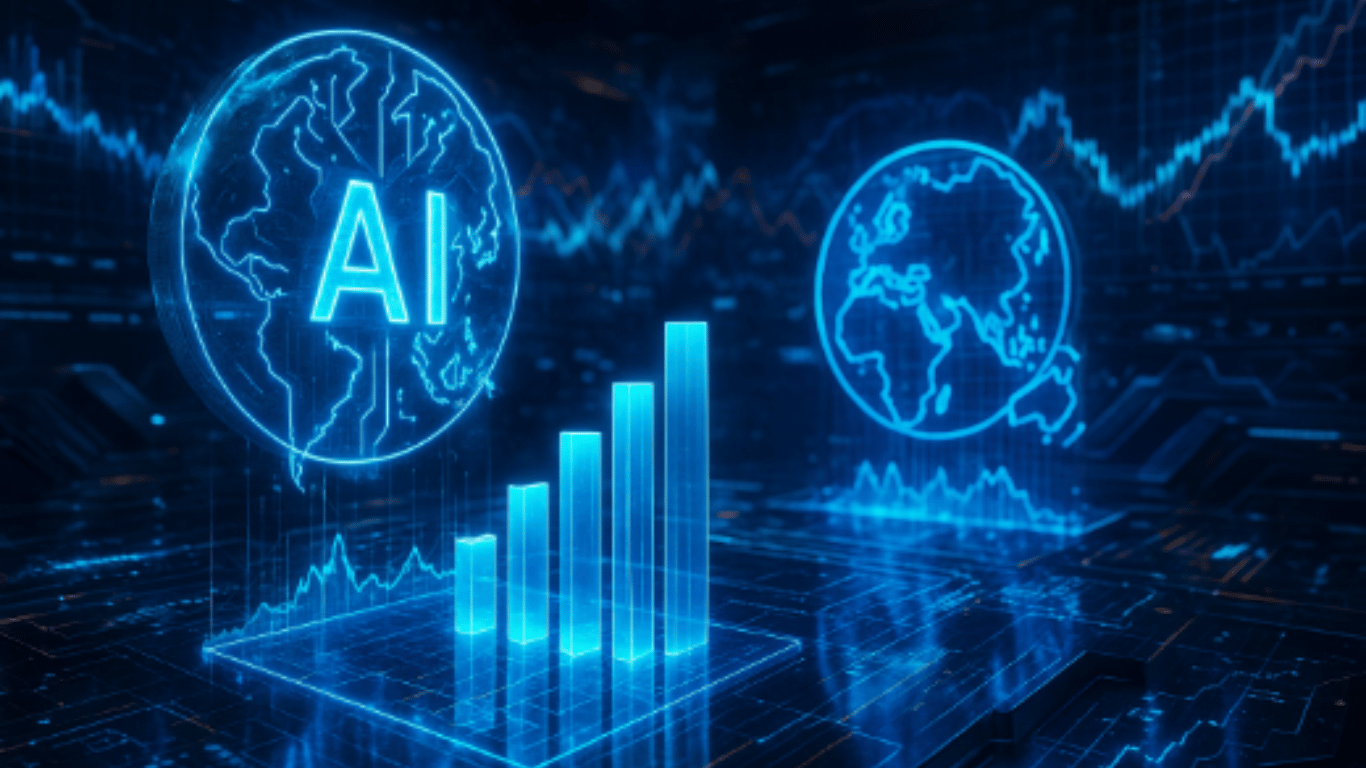Himanshu Tyagi is a professor at the Indian Institute of Science and a cofounder of Sentient.
Discover top fintech news and events!
Subscribe to FinTech Weekly's newsletter
Read by executives at JP Morgan, Coinbase, Blackrock, Klarna and more
AI’s promise demands a radically open, decentralized, and globally collaborative approach. Anything less risks a brittle, biased, and unstable future.
As governments and tech giants race to dominate AI, we’re heading toward a dangerous and short-sighted future, one where a handful of nations and corporations dictate the development of a technology that will shape the entire planet. I can’t help but feel a growing unease about the global race for AI supremacy.
It’s often sold as a high-stakes showdown—America versus China, with the winner claiming the keys to a technology that will reshape humanity’s future. As someone who’s spent years immersed in AI both professionally and academically, I’m here to call it out: this narrative is dangerously flawed. The concept of one nation shaping AI’s course is structurally convoluted and may be less than ideal.
The Global Roots of AI
The reality is that no nation can build AI in isolation, not even the United States, which produced 61 notable models in 2023, according to Stanford’s AI Index Report. The pillars of AI: talent, hardware, and data, are woven into a global tapestry that no single country can unravel and reweave alone.
Take talent, for example, of all leading AI researchers in America, nearly 70% of them were born or educated abroad, with India and China as key sources. Two-thirds of AI startups in the U.S. have at least one immigrant founder. Trying to nationalize AI while alienating foreign minds is like building a brain and cutting off half its neurons.
Hardware is even more tangled. U.S. firms like NVIDIA design AI chips, but the Netherlands’ ASML builds the only Extreme Ultraviolet (EUV) lithography machines to etch them. Taiwan’s TSMC manufactures over 90% of advanced chips, and Japan supplies critical materials. Tariffs and export controls, like those in the U.S.-China trade war, don’t secure control; they disrupt this delicate web, raising costs and stalling progress for everyone.
Data, AI’s lifeblood, is even more stubbornly global. Because diverse, global data is essential to build the most effective and universally applicable AI models.
Why Dominance Is Dangerous
Even if one nation could monopolize AI, it shouldn’t. A U.S.-dominated AI ecosystem would only create an echo chamber, embedding Western biases into systems used globally.
Today, the leading large language models (LLMs) often reflect a narrow slice of global perspectives, limiting their ability to serve diverse populations effectively. For example, language models trained primarily on one data source may fail to capture cultural nuances or variations from other areas. This can reduce the accuracy and utility of AI.
Worse, a single nation holding AI’s reins fuels a zero-sum arms race with far-reaching consequences. The narratives of the U.S.-China race for AI supremacy, often framed as a contest between OpenAI or Anthropic and Deepseek or Manus, have escalated with active government involvement. Both nations are investing heavily in AI, viewing it as a strategic resource akin to nuclear capabilities in the 20th century. If one government’s favored companies secure the most advanced AI, they could control a transformative global asset, granting unprecedented economic and political leverage.
This dynamic risks extreme censorship and gatekeeping, where superpowers dictate access to AI tools and data. Smaller nations may then be forced to align with either the U.S. or China, mirroring Cold War-era alignments during the nuclear race. For instance, countries in Africa and Southeast Asia could become dependent on superpowers and surrender autonomy over their AI futures. A dominant nation could withhold AI tools entirely, isolating rivals, or flood global markets with systems that prioritize its own narratives and interests.
This isn’t security; it’s a recipe for instability. AI-powered autonomous weapons could spark “flash wars,” where systems escalate conflicts faster than humans can intervene. A dominant power could wield AI for global surveillance or economic coercion, creating resentment and dependency.
Why Openness Is the Only Way
Building fair AI requires contributions from every corner of the world, but centralized systems wield disproportionate leverage.
For instance, Anthropic’s decision to abruptly cut off Windsurf’s access to its Claude 3.x models, without prior collaboration or transparency, demonstrates how closed AI providers can unilaterally gatekeep critical resources. Such actions not only prioritize corporate control over collective progress but also limit the ability of emerging players to build on shared infrastructure. Rising data localization laws further complicate access, making international collaboration the only path to truly representative datasets.
AI enhances our ability to think creatively, work more efficiently, and helps us solve problems faster. But ensuring these productivity gains benefit everyone demands a global, open, and collaborative approach.
If development remains concentrated within a few countries (or corporations), we risk hindering innovation, increasing inequality, and concentrating crucial decisions about the future of this growth in the hands of too few.
Open-source models break monopolies and walled gardens. When developers from Bangalore to Bogotá can build on the same foundation, we get a flood of creativity no single entity can match. History has shown that open-source projects, whether in software or science, thrive because they tap into a global pool of talent and ideas. AI is no different.
Decentralization is just as critical. Centralized systems are fragile, vulnerable to single points of failure, and prone to abuse. A decentralized approach spreads the risk and the responsibility. You only need to look at the recent global ChatGPT outage to see what happens when centralized servers break down. It was annoying for some, serious for others.
But what if we were even more reliant on AI across healthcare, infrastructure, education, or emergency response? Imagine AI infrastructure that doesn’t collapse if one nation pulls a lever or one company flips a switch. That’s the future we need – one where no single player holds all the keys.
A Call for Digital Internationalism
So, when I’m asked, “Who should lead AI: America or China?” My answer is nuanced. We need digital internationalism: shared tools, shared standards, shared responsibility. AI isn’t like oil or steel. It’s not a resource to hoard or a weapon to wield. It’s a technology that will redefine how we live, work, and solve the world’s toughest problems. So, treating it as a national asset or a corporate trophy misunderstands its nature and risks its future.
The EU’s rights-based AI Act, China’s state-driven model, and the U.S.’s market-led approach each have both strengths and weaknesses, but none is the whole answer. We need dialogue, not dominance. The rest of the world, India, Brazil, Nigeria, and beyond, has equal stake in this technology. We can’t trust one nation, no matter how benevolent, to call the shots. Nor can we afford an arms race where AI becomes a tool of domination rather than progress.
And global governance doesn’t mean ceding control. It means setting a baseline of access and accountability that benefits everyone. Open-source frameworks, transparent development, and collaborative oversight can ensure AI serves humanity, not just a privileged few. America can still lead, but not by hoarding power. It can lead by example, building systems that work for and with the world, systems that invite participation, not exclusion.
About the Author:
Himanshu Tyagi is a professor at the Indian Institute of Science and a cofounder of Sentient. He has conducted foundational research on information theory, AI and cryptography and has founded multiple companies spanning crypto, AI and communications. Himanshu is dedicated to creating technology and products for the connected future, where information networks turbocharged by AI and crypto will drive all human aspirations.
He is a recipient of the Indian National Science Academy Young Scientist Award, a recipient of the Early Career Distinguished Alumni Award of the University of Maryland, has served as the Associate Editor for Transactions on Information Theory, and has multiple best paper awards at top conferences. He has published a book titled “Information-theoretic Cryptography” with Cambridge University Press.













